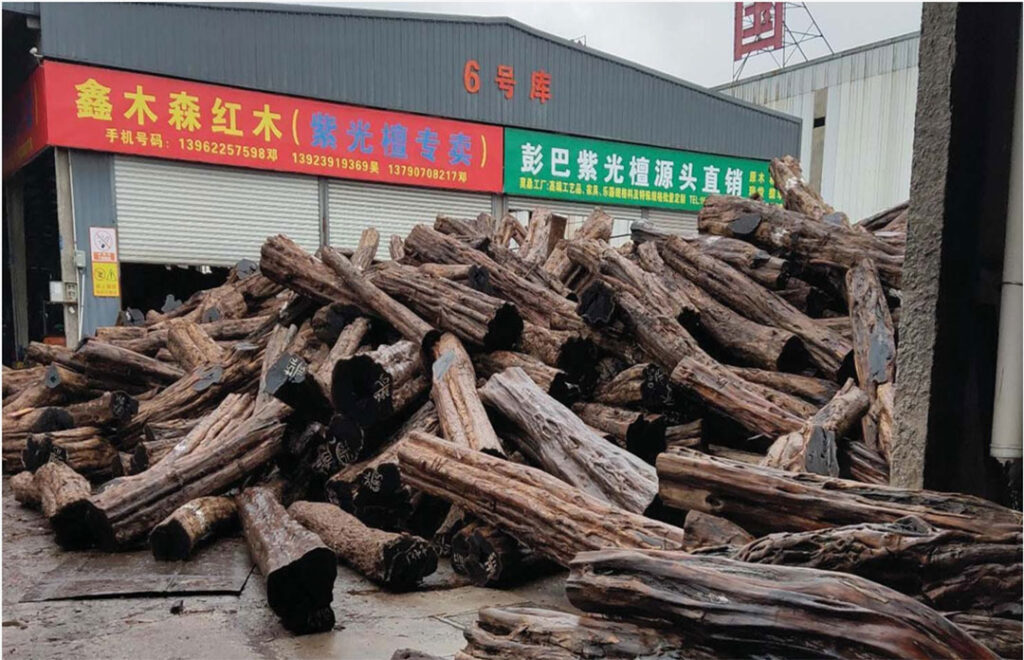ADF STAFF
Mozambique has eclipsed other African countries as China’s primary supplier of rosewood, a material coveted for its use in expensive furniture.
Mozambique shipped 20,000 metric tons of the internationally protected timber to China in 2023 alone, despite a long-standing ban on exporting logs. In doing so, Mozambique overtook Madagascar, Nigeria and Senegal as China’s major rosewood source. Those other countries have either seen their native rosewood supplies stripped or depleted by Chinese logging companies or they have begun enforcing existing rosewood bans more strictly, according to experts.
Much of Mozambique’s loggers, both legal and illicit, harvest in Cabo Delgado province, which remains under assault by Ahlu Sunnah Wal Jamaah insurgents who have ties to the Islamic State group. The insurgents benefit financially from illicit logging, according to a recent report by the Environmental Investigation Agency (EIA).
The EIA recently completed a four-year investigation into rosewood smuggling in Mozambique and found that up to 30% of the country’s rosewood grows in forests controlled by insurgents.
Illicit rosewood logging has contributed to the loss of more than 4 million hectares of forest cover in Mozambique over the last 20 years. The country continues to lose the equivalent of 1,000 soccer pitches of forest cover every day, according to Global Forest Watch.
“The bleeding has to stop,” the EIA’s Alex Bloom told Voice of America. “Mozambique has had a log export ban since 2017, but we can see clearly that China — the importer of more than 90% of Mozambique’s wood — has continued massive volume of imports of logs.”
EIA investigators traced around 300 containers of a type of rosewood known as pau preto from the port of Beira to China between October 2023 and March 2024. Collectively, the shipments amounted to 10,000 metric tons of rosewood worth more than $18 million. Some of the shipments included unprocessed logs, which violated Mozambique’s ban on exporting logs of any kind.
The EIA’s investigation found that rosewood smuggling between Mozambique and China was driven by three factors: poor management of forest concessions, illegal logging and corruption among port officials. Together, those factors allowed illicit logging to grow unchecked in insurgent-controlled areas.
Rosewood is an umbrella term for several species of trees that produce deep red lumber. The wood is prized in China, where it is known as “hongmu,” for making expensive reproductions of Ming Dynasty furniture. Rosewood is the world’s most heavily trafficked wildlife product, accounting for more than one-third of all smuggled species.
The trees are protected under the United Nations’ Convention on International Trade of Endangered Species (CITES), which limits the amount of logs a country can harvest and export while guaranteeing the survival of the species. CITES puts the burden on receiving countries to detect CITES violations.
China banned the harvesting of its native rosewood in 1998 after uncontrolled logging devastated local supplies. Chinese logging companies soon turned to Africa, starting with The Gambia in 2001. With in a decade, Gambian rosewood was declared extinct. Despite that, The Gambia continued to export rosewood, much of it harvested illicitly in Senegal.
In 2017, Mozambique’s then-Environment Minister Celso Correia said illegal logging cost his country half a billion dollars a year in lost revenue. A crackdown on 120 timber yards found illegal operations in more than half of them.
Mozambique has worked to end unsustainable and illicit logging by imposing multiple bans on cutting and exporting logs going back more than 20 years.
“Despite these multiple layers of protection, the forest plunder continues, as timber traders traffic the wood by exploiting the chronic instability and corruption in Cabo Delgado,” EIA investigators wrote in their report titled “Shipping the Forest.”
Chinese traders get around export bans in part by mixing rosewood bought in Cabo Delgado with other legal logs in shipping containers, according to the EIA. They also mislabel the contents of shipping containers to hide rosewood shipments.
Properly enforced, log export bans are critical to protecting forests and sustaining livelihoods, according to Raphael Edou, Africa program director for the EIA.
“Mozambique must strengthen its forest protections by enforcing its own regulations, and China and the global shipping lines must respect Mozambican laws and investigate the bad actors systematically violating them.”

